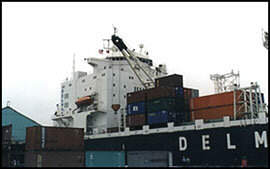 MARITIME MARITIME |

Liberia is ranked the world's second largest maritime nation. Its liberal requirements for registration for sea-worthy vessels to fly the Liberian flag have earned the program the nickname "Flag of Convenience."
The maritime program is about 53 years old, inaugurating its first vessel called World Peace just around 1948. As a founding member of the International Maritime Organization (IMO), Liberia is a party to various conventions of the IMO, making its ports comply with such conventions to cover a wider sector of the International Maritime Transport System.
Liberia once occupied the position of the world's largest maritime nation for many years, before somersaulting to the second position during its civil conflict because the country's maritime agent at the time "didn't do the necessary marketing to keep us going".
This must have necessitated the change of the United States-based International Registry Incorporated, which had controlled the Liberian registry since 1948, replacing it with another American company, the Liberia International Ship and Corporate Registry(LISCR).
By the year 2000, the Liberian registry was accounting for about 1,800 vessels flying the Liberian flag on oceans across the globe, netting an average of some 18million USD per annum from registration and other charges. | But though second on the global registry, Liberia today enjoys the enviable recognition of having the world's best safety record, being number one on the "white list" presented by the IMO.
"We have the world's best safety record. We are Number One on the white list presented by the IMO. Our casualty rate is low to the point that it is negligible. Our safety record is what attracts ship owners to the Liberian registry," Mr. Benoni Urey Commissioner of the Bureau of Maritime Affairs (BMA) points out.
One of the marketing goals of the Liberian maritime program is to make it user-friendly and optimal service-oriented to ship owners and seafarers, the Maritime Bureau outlines as one of its priorities.
To this end, appropriate software and Internet services are been introduced to address such perennial problems as backlog in seamen's ID inquiries, slow billing processes and registration of vessels, among other easy to remove problems.
"You can get your seaman ID within one hour of sending an E-mail. We are developing software where billings can be sent out on-line, where problems can be answered on-line. We have spent a lot of money correcting our errors and trying to create a registry that is answerable to customers demands almost immediately," the maritime official says.
The Liberian maritime program runs some 15 offices in major cities around the world, including Hong Kong, London, Switzerland, Germany, Athens, New York and, of course, Monrovia, the home of the program.
Annual revenue from the maritime program has constituted one of the primary sources of income for the Liberian government in the past decade or so. |

